- Home
- George Eliot
Mr Gilfil's Love Story
Mr Gilfil's Love Story Read online
Mr. Gilfil's Love Story
George Eliot
Chapter 1
WHEN old Mr Gilfil died, thirty years ago, there was general sorrow in
Shepperton; and if black cloth had not been hung round the pulpit and
reading-desk, by order of his nephew and principal legatee, the parishioners
would certainly have subscribed the necessary sum out of their own pockets,
rather than allow such a tribute of respect to be wanting. All the farmers'
wives brought out their black bombasines; and Mrs Jennings, at the Wharf, by
appearing the first Sunday after Mr Gilfil's death in her salmon-coloured
ribbons and green shawl, excited the severest remark. To be sure, Mrs Jennings
was a new-comer, and town-bred, so that she could hardly be expected to have
very clear notions of what was proper; but, as Mrs Higgins observed in an
undertone to Mrs Parrot when they were coming out of church, 'Her husband, who'd
been born i' the parish, might ha' told her better.' An unreadiness to put on
black on all available occasions, or too great an alacrity in putting it off,
argued, in Mrs Higgins's opinion, a dangerous levity of character, and an
unnatural insensibility to the essential fitness of things.
'Some folks can't a-bear to put off their colours,' she remarked; 'but that was
never the way i' my family. Why, Mrs Parrot, from the time I was married, till
Mr Higgins died, nine years ago come Candlemas, I niver was out o' black two
year together! '
'Ah,' said Mrs Parrot, who was conscious of inferiority in this respect, 'there
isn't many families as have had so many deaths as yours, Mrs Higgins.'
Mrs Higgins, who was an elderly widow, 'well left', reflected with complacency
that Mrs Parrot's observation was no more than just, and that Mrs Jennings very
likely belonged to a family which had had no funerals to speak of.
Even dirty Dame Fripp, who was a very rare church-goer, had been to Mrs Hackit
to beg a bit of old crape, and with this sign of grief pinned on her little
coal-scuttle bonnet, was seen dropping her curtsy opposite the reading-desk.
This manifestation of respect towards Mr Gilfil's memory on the part of Dame
Fripp had no theological bearing whatever. It was due to an event which had
occurred some years back, and which, I am sorry to say, had left that grimy old
lady as indifferent to the means of grace as ever. Dame Fripp kept leeches, and
was understood to have such remarkable influence over those wilful animals in
inducing them to bite under the most unpromising circumstances, that though her
own leeches were usually rejected, from a suspicion that they had lost their
appetite, she herself was constantly called in to apply the more lively
individuals furnished from Mr Pilgrim's surgery, when, as was very often the
case, one of that clever man's paying patients was attacked with inflammation.
Thus Dame Fripp, in addition to 'property' supposed to yield her no less than
half-a-crown a-week, was in the receipt of professional fees, the gross amount
of which was vaguely estimated by her neighbours as 'pouns an' pouns'. Moreover,
she drove a brisk trade in lollipop with epicurean urchins, who recklessly
purchased that luxury at the rate of two hundred per cent. Nevertheless, with
all these notorious sources of income, the shameless old woman constantly
pleaded poverty, and begged for scraps at Mrs Hackit's, who, though she always
said Mrs Fripp was 'as false as two folks', and no better than a miser and a
heathen, had yet a leaning towards her as an old neighbour.
'There's that case-hardened old Judy a-coming after the tea-leaves again,' Mrs
Hackit would say; 'an' I'm fool enough to give 'em her, though Sally wants 'em
all the while to sweep the floors with! '
Such was Dame Fripp, whom Mr Gilfil, riding leisurely in top-boots and spurs
from doing duty at Knebley one warm Sunday afternoon, observed sitting in the
dry ditch near her cottage, and by her side a large pig, who, with that ease and
confidence belonging to perfect friendship, was lying with his head in her lap,
and making no effort to play the agreeable beyond an occasional grunt.
'Why, Mrs Fripp,' said the Vicar, 'I didn't know you had such a fine pig. You'll
have some rare flitches at Christmas!'
'Eh, God forbid! My son gev him me two 'ear ago, an' he's been company to me
iver sin'. I couldn't find i' my heart to part wi'm, if I niver knowed the taste
o' bacon-fat again.'
'Why, he'll eat his head off, and yours too. How can you go on keeping a pig,
and making nothing by him?'
'O, he picks a bit hisself wi' rootin', and I dooant mind doing wi'out to gi'
him summat. A bit o' coompany's meat an' drink too, an' he follers me about, and
grunts when I spake to'm, just like a Christian.'
Mr Gilfil laughed, and I am obliged to admit that he said good-bye to Dame Fripp
without asking her why she had not been to church, or making the slightest
effort for her spiritual edification. But the next day he ordered his man David
to take her a great piece of bacon, with a message, saying, the parson wanted to
make sure that Mrs Fripp would know the taste of bacon-fat again. So, when Mr
Gilfil died, Dame Fripp manifested her gratitude and reverence in the simply
dingy fashion I have mentioned.
You already suspect that the Vicar did not shine in the more spiritual functions
of his office; and indeed, the utmost I can say for him in this respect is, that
he performed those functions with undeviating attention to brevity and despatch.
He had a large heap of short sermons, rather yellow and worn at the edges, from
which he took two every Sunday, securing perfect impartiality in the selection
by taking them as they came, without reference to topics; and having preached
one of these sermons at Shepperton in the morning, he mounted his horse and rode
hastily with the other in his pocket to Knebley, where he officiated in a
wonderful little church, with a checkered pavement which had once rung to the
iron tread of military monks, with coats of arms in clusters on the lofty roof,
marble warriors and their wives without noses occupying a large proportion of
the area, and the twelve apostles, with their heads very much on one side,
holding didactic ribbons, painted in fresco on the walls. Here, in an ahsence of
mind to which he was prone, Mr Gilfil would sometimes forget to take off his
spurs before putting on his surplice, and only hecome aware of the omission by
feeling something mysteriously tugging at the skirts of that garment as he
stepped into the reading-desk. But the Knebley farmers would as soon have
thought of criticizing the moon as their pastor. He belonged to the course of
nature, like markets and toll-gates and dirty hank-notes; and heing a vicar, his
claim on their veneration had never been counteracted by an exasperating claim
on their pockets. Some of them, who did not indulge in the
superfluity of a
covered cart without springs, had dined half an hour earlier than usual �that is
to say, at twelve o'clock�in order to have time for their long walk through miry
lanes, and present themselves duly in their places at two o'clock, when Mr
Oldinport and Lady Felicia, to whom Knebley Church was a sort of family temple,
made their way among the bows and curtsies of their dependants to a carved and
canopied pew in the chancel, diffusing as they went a delicate odour of Indian
roses on the unsusceptible nostrils of the congregation.
The farmers' wives and children sat on the dark oaken benches, but the husbands
usually chose the distinctive dignity of a stall under one of the twelve
apostles, where, when the alternation of prayers and responses had given place
to the agreeable monotony of the sermon, Paterfamilias might be seen or heard
sinking into a pleasant doze, from which he infallibly woke up at the sound of
the concluding doxology. And then they made their way back again through the
miry lanes, perhaps almost as much the better for this simple weekly tribute to
what they knew of good and right, as many a more wakeful and critical
congregation of the present day.
Mr Gilfil, too, used to make his way home in the later years of his life, for he
had given up the habit of dining at Knebley Abbey on a Sunday, having, I am
sorry to say, had a very bitter quarrel with Mr Oldinport, the cousin and
predecessor of the Mr Oldinport who flourished in the Rev. Amos Barton's time.
That quarrel was a sad pity, for the two had had many a good day's hunting
together when they were younger, and in those friendly times not a few members
of the hunt envied Mr Oldinport the excellent terms he was on with his vicar;
for, as Sir Jasper Sitwell observed, 'next to a man's wife, there's nobody can
be such an infernal plague to you as a parson, always under your nose on your
own estate.'
I fancy the original difference which led to the rupture was very slight; but Mr
Gilfil was of an extremely caustic turn, his satire having a flavour of
originality which was quite wanting in his sermons; and as Mr Oldinport's armour
of conscious virtue presented some considerable and conspicuous gaps, the
Vicar's keen-edged retorts probably made a few incisions too deep to be
forgiven. Such, at least, was the view of the case presented by Mr Hackit, who
knew as much of the matter as any third person. For, the very week after the
quarrel, when presiding at the annual dinner of the Association for the
Prosecution of Felons, held at the Oldinport Arms, he contributed an additional
zest to the conviviality on that occasion by informing the company that 'the
parson had given the squire a lick with the rough side of his tongue.' The
detection of the person or persons who had driven off Mr Parrot's heifer, could
hardly have been more welcome news to the Shepperton tenantry, with whom Mr
Oldinport was in the worst odour as a landlord, having kept up his rents in
spite of falling prices, and not being in the least stung to emulation by
paragraphs in the provincial newspapers, stating that the Honourable Augustus
Purwell, or Viscount Blethers, had made a return of ten per cent on their last
rent-day. The fact was, Mr Oldinport had not the slightest intention of standing
for Parliament, whereas he had the strongest intention of adding to his
unentailed estate. Hence, to the Shepperton farmers it was as good as lemon with
their grog to know that the Vicar had thrown out sarcasms against the Squire's
charities, as little better than those of the man who stole a goose, and gave
away the giblets in alms. For Shepperton, you observe, was in a state of Attic
culture compared with Knebley; it had turnpike roads and a public opinion,
whereas, in the Boeotian Knebley, men's minds and waggons alike moved in the
deepest of ruts, and the landlord was only grumbled at as a necessary and
unalterable evil, like the weather, the weevils, and the turnip-fly.
Thus in Shepperton this breach with Mr Oldinport tended only to heighten that
good understanding which the Vicar had always enjoyed with the rest of his
parishioners, from the generation whose children he had christened a quarter of
a century before, down to that hopeful generation represented by little Tommy
Bond, who had recently quitted frocks and trousers for the severe simplicity of
a tight suit of corduroys, relieved by numerous brass buttons. Tommy was a saucy
boy, impervious to all impressions of reverence, and excessively addicted to
humming-tops and marbles, with which recreative resources he was in the habit of
immoderately distending the pockets of his corduroys. One day, spinning his top
on the garden-walk, and seeing the Vicar advance directly towards it, at that
exciting moment when it was beginning to 'sleep' magnificently, he shouted out
with all the force of his lungs�'Stop! don't knock my top down, now! ' From that
day 'little Corduroys' had been an especial favourite with Mr Gilfil, who
delighted to provoke his ready scorn and wonder by putting questions which gave
Tommy the meanest opinion of his intellect. 'Well, little Corduroys, have they
milked the geese today?' 'Milked the geese! why, they don't milk the geese, you
silly! ' 'No! dear heart! why, how do the goslings live, then?'
The nutriment of goslings rather transcending Tommy's observations in natural
history, he feigned to understand this question in an exclamatory rather than an
interrogatory sense, and became absorbed in winding up his top.
'Ah, I see you don't know how the goslings live! But did you notice how it
rained sugar-plums yesterday?' (Here Tommy became attentive.) 'Why, they fell
into my pocket as I rode along. You look in my pocket and see if they didn't.'
Tommy, without waiting to discuss the alleged antecedent, lost no time in
ascertaining the presence of the agreeable consequent, for he had a well-founded
belief in the advantages of diving into the Vicar's pocket. Mr Gilfil called it
his wonderful pocket, because, as he delighted to tell the 'young shavers' and
'two-shoes'�so he called all little boys and girls� whenever he put pennies into
it, they turned into sugar-plums or gingerbread, or some other nice thing.
Indeed, little Bessie Parrot, a flaxen-headed 'two-shoes', very white and fat as
to her neck, always had the admirable directness and sincerity to salute him
with the question�'What zoo dot in zoo pottet?'
You can imagine, then, that the christening dinners were none the less merry for
the presence of the parson. The farmers relished his society particularly, for
he could not only smoke his pipe, and season the details of parish affairs with
abundance of caustic jokes and proverbs, but, as Mr Bond often said, no man knew
more than the Vicar about the breed of cows and horses. He had grazing-land of
his own about five miles off, which a bailiff, ostensibly a tenant, farmed under
his direction; and to ride backwards and forwards, and look after the buying and
selling of stock, was the old gentleman's chief relaxation, now his hunting-days
were over. To hear him discussing the resp
ective merits of the Devonshire breed
and the short-horns, or the last foolish decision of the magistrates about a
pauper, a superficial observer might have seen little difference, beyond his
superior shrewdness, between the Vicar and his bucolic parishioners; for it was
his habit to approximate his accent and mode of speech to theirs, doubtless
because he thought it a mere frustration of the purposes of language to talk of
'shear-hogs' and 'ewes' to men who habitually said 'sharrags' and 'yowes'.
Nevertheless the farmers themselves were perfectly aware of the distinction
between them and the parson, and had not at all the less belief in him as a
gentleman and a clergyman for his easy speech and familiar manners. Mrs Parrot
smoothed her apron and set her cap right with the utmost solicitude when she saw
the Vicar coming, made him her deepest curtsy, and every Christmas had a fat
turkey ready to send him with her 'duty' And in the most gossiping colloquies
with Mr Gilfil, you might have observed that both men and women 'minded their
words', and never became indifferent to his approbation.
The same respect attended him in his strictly clerical functions. The benefits
of baptism were supposed to be somehow bound up with Mr Gilfil's personality, so
metaphysical a distinction as that between a man and his office being, as yet,
quite foreign to the mind of a good Shepperton Churchman, savouring, he would
have thought, of Dissent on the very face of it. Miss Selina Parrot put off her
marriage a whole month when Mr Gilfil had an attack of rheumatism, rather than
be married in a makeshift manner by the Milby curate.
'We've had a very good sermon this morning', was the frequent remark, after
hearing one of the old yellow series, heard with all the more satisfaction
because it had been heard for the twentieth time; for to minds on the Shepperton
level it is repetition, not novelty, that produces the strongest effect; and
phrases, like tunes, are a long time making themselves at home in the brain.
Mr Gilfil's sermons, as you may imagine, were not of a highly doctrinal, still
less of a polemical, cast. They perhaps did not search the conscience very
powerfully; for you remember that to Mrs Patten, who had listened to them thirty
years, the announcement that she was a sinner appeared an uncivil heresy; but,
on the other hand, they made no unreasonable demand on the Shepperton intellect�
amounting, indeed, to little more than an expansion of the concise thesis, that
those who do wrong will find it the worse for them, and those who do well will
find it the better for them; the nature of wrong-doing being exposed in special
sermons against lying, backbiting, anger, slothfulness, and the like; and
well-doing being interpreted as honesty, truthfulness, charity, industry, and
other common virtues, lying quite on the surface of life, and having very little
to do with deep spiritual doctrine. Mrs Patten understood that if she turned out
ill-crushed cheeses, a just retribution awaited her; though, I fear, she made no
particular application of the sermon on backbiting. Mrs Hackit expressed herself
greatly edified by the sermon on honesty, the allusion to the unjust weight and
deceitful balance having a peculiar lucidity for her, owing to a recent dispute
with her grocer; but I am not aware that she ever appeared to be much struck by
the sermon on anger.
As to any suspicion that Mr Gilfil did not dispense the pure Gospel, or any
strictures on his doctrine and mode of delivery, such thoughts never visited the
minds of the Shepperton parishioners�of those very parishioners who, ten or
fifteen years later, showed themselves extremely critical of Mr Barton's
discourses and demeanour. But in the interim they had tasted that dangerous
fruit of the tree of knowledge�innovation, which is well known to open the eyes,

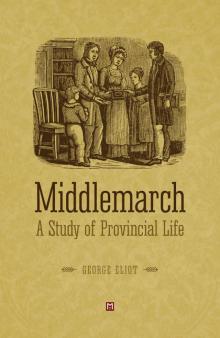 Middlemarch
Middlemarch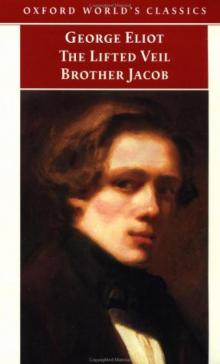 Brother Jacob
Brother Jacob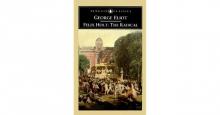 Felix Holt, the Radical
Felix Holt, the Radical Mr Gilfil's Love Story
Mr Gilfil's Love Story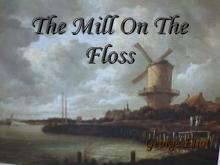 The Mill on the Floss
The Mill on the Floss Silas Marner
Silas Marner Adam Bede
Adam Bede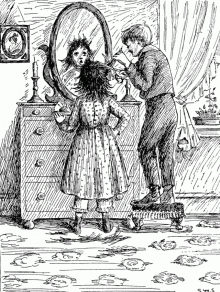 Tom and Maggie Tulliver
Tom and Maggie Tulliver The Damn Fool
The Damn Fool The Lifted Veil
The Lifted Veil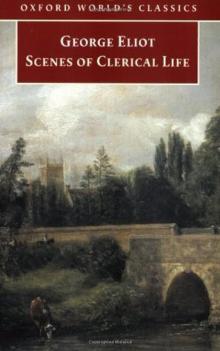 Scenes of Clerical Life
Scenes of Clerical Life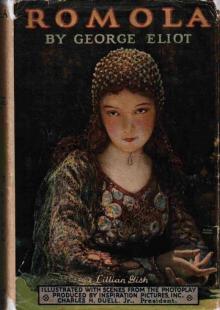 Romola
Romola Daniel Deronda
Daniel Deronda Felix Holt
Felix Holt